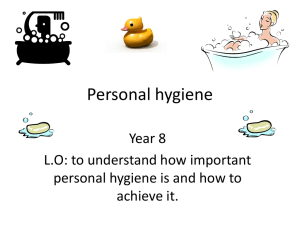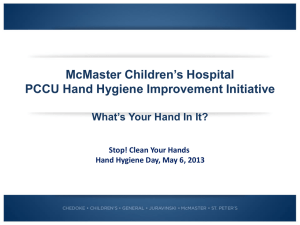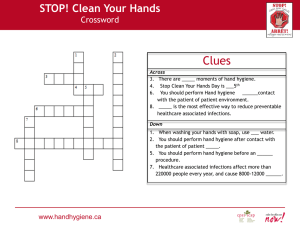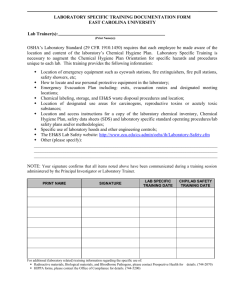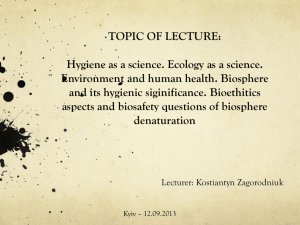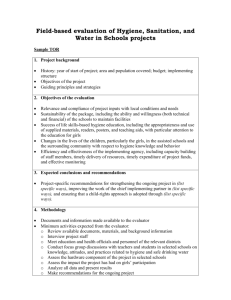Preventive maintenance of food poisonings
advertisement
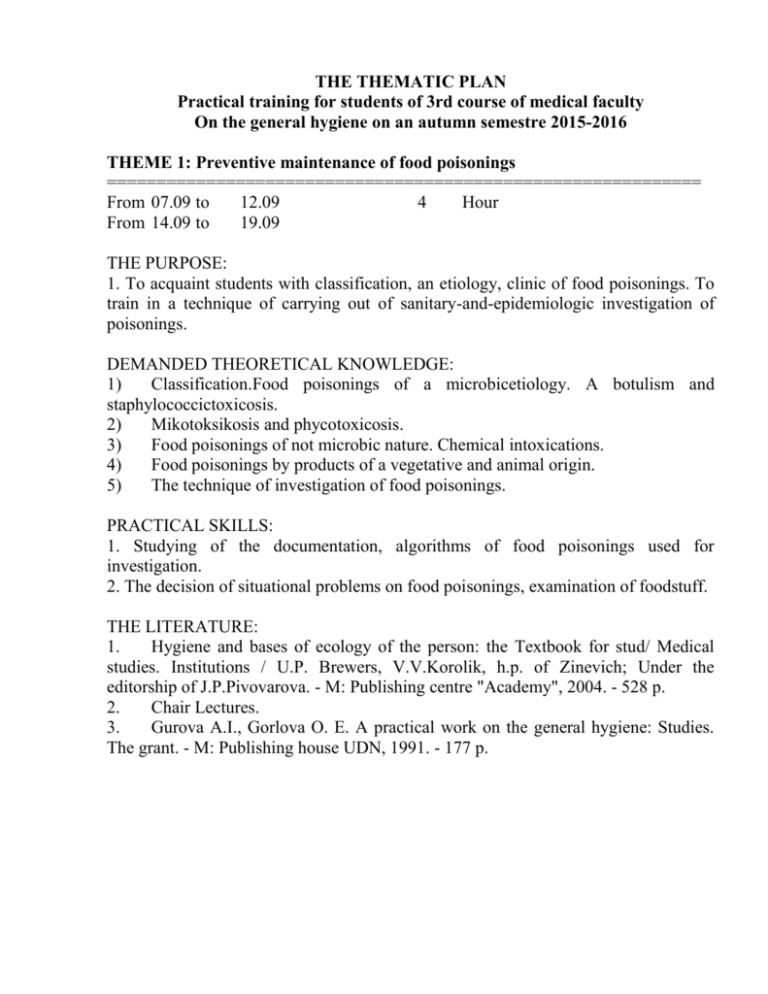
THE THEMATIC PLAN Practical training for students of 3rd course of medical faculty On the general hygiene on an autumn semestre 2015-2016 THEME 1: Preventive maintenance of food poisonings ============================================================ From 07.09 to 12.09 4 Hour From 14.09 to 19.09 THE PURPOSE: 1. To acquaint students with classification, an etiology, clinic of food poisonings. To train in a technique of carrying out of sanitary-and-epidemiologic investigation of poisonings. DEMANDED THEORETICAL KNOWLEDGE: 1) Classification.Food poisonings of a microbicetiology. A botulism and staphylococcictoxicosis. 2) Mikotoksikosis and phycotoxicosis. 3) Food poisonings of not microbic nature. Chemical intoxications. 4) Food poisonings by products of a vegetative and animal origin. 5) The technique of investigation of food poisonings. PRACTICAL SKILLS: 1. Studying of the documentation, algorithms of food poisonings used for investigation. 2. The decision of situational problems on food poisonings, examination of foodstuff. THE LITERATURE: 1. Hygiene and bases of ecology of the person: the Textbook for stud/ Medical studies. Institutions / U.P. Brewers, V.V.Korolik, h.p. of Zinevich; Under the editorship of J.P.Pivovarova. - М: Publishing centre "Academy", 2004. - 528 p. 2. Chair Lectures. 3. Gurova A.I., Gorlova O. E. A practical work on the general hygiene: Studies. The grant. - М: Publishing house UDN, 1991. - 177 p. TOPIC 2: Hygienic requirements to patient’s nutrition in hospital ============================================================= From 21.09 to 26.09 4 Hour Fom 28.09 to 03.10 THE PURPOSE: To familiarize with catering services of patients, a lay-out, the equipment and a sanitary mode of nutrition unit. DEMANDED THEORETICAL KNOWLEDGE: 1) Hygienic principles dietary and dietetic therapy. 2) The Characteristic of the basic medical diets. 3) Catering services treatment-and-prophylactic establishments. PRACTICAL SKILLS: To familiarize with instructive materials on sanitary inspection of nutrition unit of hospital. THE LITERATURE: 1. Hygiene and bases of ecology of the person: the Textbook for stud/ Medical studies. Institutions / U.P. Brewers, V.V.Korolik, h.p. of Zinevich; Under the editorship of J.P.Pivovarova. - М: Publishing centre "Academy", 2004. - 528 p. 2. Chair Lectures. 3. Gurova A.I., Gorlova O. E. A practical work on the general hygiene: Studies. The grant. - М: Publishing house UDN, 1991. - 177 p. 4. Hygiene. The textbook for HIGH SCHOOLS. / under edition of Pokrovsk Century А - М, 1979. THEME 3: Hygiene of the treatment-and-prophylactic organizations. hygienic requirements to a lay-out, building and functioning of treatment-andprophylactic establishments of a different profile ============================================================= From 05.10 to 10.10 4 Hour From 12.10 to 17.10 THE PURPOSE: To study hygienic requirements to placing, a lay-out and the equipment of the organizations of public health services. DEMANDED THEORETICAL KNOWLEDGE: 1) Hygienic examination of the project of the therapeutic case. 2) Hygienic requirements to the ground area. 3) The Hygienic estimation of the general layout of hospital. 4) The Hygienic estimation of an internal lay-out of the therapeutic case. 5) Hygienic requirements to the device and the equipment to hospital room of therapeutic branch. PRACTICAL SKILLS: 1. A hygienic estimation of the situational plan of hospital, the scheme of branches 2. The decision of situational problems. THE LITERATURE: 1. Hygiene and bases of ecology of the person: the Textbook for st. high. Medical studies. Institutions / U.P. Brewers, V.V.Korolik, h.p. of Zinevich; Under the editorship of J.P.Pivovarova. - М: Publishing centre "Academy", 2004. - 528 p. 2. Chair Lectures. 3. Gurova A.I., Gorlova O. E. A practical work on the general hygiene: Studies. The grant. - М: Publishing house UDN, 1991. - 177 p. 4. Hygiene. The textbook for HIGH SCHOOLS. / under edition of Pokrovsk Century А - М, 1979. THEME 4: Hygiene of children and adolescents. Criteria of a hygienic estimation of physical development and a state of health of children and adolescents ============================================================= From 19.10 to 24.10 4 Hour From 26.10 to 31.10 THE PURPOSE: 1. To Acquaint students with methods of an estimation of physical development of children and adolescents. 2. To Study criteria of a complex estimation of a state of health of children and adolescents. DEMANDED THEORETICAL KNOWLEDGE: 1. Hygiene of children and adolescents: concept definition, the purpose, problems. 2. The basic laws of growth and development of a children's organism. 3. The age periods of life of children and adolescents and their characteristic. 4. Methods of an estimation of physical development. 5. The factors influencing formation of health of children. Health groups. PRACTICAL SKILLS: 1. Development of methods of an estimation of level of physical development of children and adolescent; 2. The decision of situational problems according to level of physical development, a harmony. THE LITERATURE: 1. Hygiene: the Textbook, 2 part., the reslave. / G.I.Rumjantseva's Russian Academy of Medical Science. - М: GEOTAR-HONEY, 2002. - 608 p. 2. Hygiene and bases of ecology of the person: the Textbook for st. High. Medical studies. Institutions / U.P. Brewers, V.V.Korolik, h.p. of Zinevich; Under the editorship of J.P.Pivovarova. - М: Publishing centre "Academy", 2004. - 528 with. 3. Chair Lectures. 4. Gurova A.I., Gorlova O. E. A practical work on the general hygiene: Studies. The grant. - М: Publishing house UDN, 1991. - 177 p. 5. Hygiene. The textbook for HIGH SCHOOLS. / under edition of Pokrovsk Century А - М, 1979. THEME 5: Hygiene and physiology of work. Principles and methods of an estimation of a functional condition of an organism at various kinds of work. Fatigue research, an estimation of weight and intensity of work ============================================================ From 02.11 to 06.11 4 Hour From 09.11 to 14.11 The PURPOSE: to Master methods of an estimation of working capacity on indicators of a functional condition of an organism, to be able to reveal dynamics of working capacity and to make recommendations about exhaustion decrease. DEMANDED THEORETICAL KNOWLEDGE: 1. Classification kinds of work. Working conditions. 2. Factors of the irrational organization of work as industrial harm. 3. Functional changes in an organism at work. 4. Classification of functional conditions of an organism. 5. The Physiological characteristic of dynamics of working capacity, its phase. Exhaustion and overfatigue. 6. The Estimation of weight and intensity of work. 7. Measures of preventive maintenance of exhaustion and overfatigue, value of productive leisure. 8. The Overstrain of separate bodies and systems, preventive maintenance of the diseases connected with them. 9. A work and rest Mode, influence of a mode on health, working capacity and a psychological condition. PRACTICAL SKILLS: 1. To be able to conduct researches of a functional condition of a human body in the course of labour activity. To be able to estimate working capacity and to make recommendations about exhaustion decrease. THE LITERATURE: 1. Hygiene. The textbook for HIGH SCHOOLS. / under the general G.I.Rumjantseva's Russian Academy of Medical Science. - Moscow. - GEOTARMEDICAL - 2002. 2. Gurova A.I., Gorlova O. E. A practical work on the general hygiene. - Moscow, 1991. 3. Hygiene. The textbook for HIGH SCHOOLS. / under edition of Pokrovsk Century А - М, 1979. 4. The Lecture material. THEME 6: The Characteristic of the trades connected with influence of physical, chemical and biological factors ============================================================= From 16.11 to 21.11 4 Hour From 23.11 to 28.11 THE PURPOSE: 1. To Teach modern methods of classification of working conditions on classes according to new SanPiN № 11-6-2002. DEMANDED THEORETICAL KNOWLEDGE: 1. Noise, its hygienic characteristic, classification. 2. Vibrations, local and the general, their hygienic characteristic. 3. The dust Characteristic of fibrinogenic actions. 4. The Hygienic characteristic of chemical harmful substances in the industry. 5. Sharp and chronic industrial poisonings. 6. Hygienic actions for primary preventive maintenance of sharp and chronic poisonings on manufacture. 7. Factory hygiene in agriculture. PRACTICAL SKILLS: 1. To be able to estimate working conditions in manufacture and to appoint a complex of the preventive actions directed on improvement of working conditions and preservation of health. 2. To Estimate the working conditions. THE LITERATURE: 1. Rumjantsev G. I, etc. «the General hygiene», М, 1985, s.385-390, 253-267, 383-390, 393-405, 258-271, 323-331, 354-359. 2. Gabovich R. D, etc. "Hygiene", Kiev, 1984г., s.36-40, 202-220, 129-133, 235235, 189-207. 3. Gurova A.I., Gorlova O. E «the Practical work on the general hygiene», M. 1991г. s.159-162, 168-169, 172-174, 153-158. 4. Pokrovsk Century А "Hygiene", M. 1979г.s.303-307, 323-340, 390-395, 274303. 5. The Management to laboratory researches on factory hygiene (under V.F.Kirillova's edition, M. 1993y.) p. 68-111, 126-141, 186-200, 249-268, 36-53. 6. Brewers Ю.П. With соавт. «The management to laboratory researches on hygiene». М, 1983, 256 p. 7. The Lecture material. THEME 7: The characteristic of the trades connected to influence of industrial poisons. prophylaxis of poisonings ============================================================= From 30.11 to 05.12 4 Hour Fom 07.12 to 12.12 THE PURPOSE: To Teach modern methods of classification of working conditions. Prophylaxis of poisonings. DEMANDED THEORETICAL KNOWLEDGE: 1. The Hygienic characteristic of chemical harmful substances in the industry. 2. Sharp and chronic industrial poisonings. 3. Hygienic actions for primary preventive maintenance of sharp and chronic poisonings on manufacture. PRACTICAL SKILLS: To Estimate the working conditions. THE LITERATURE: 1. Chair Lectures. 2. Gurova A.I., Gorlova O. E. A practical work on the general hygiene: Studies. The grant. - М: Publishing house UDN, 1991. - 177 p. 3. Hygiene. The textbook for HIGH SCHOOLS. / under edition of Pokrovsk Century А - М, 1979. TOPIC 8: Hygienic requirements to accommodation of patients in hospital ============================================================= From 14.12 to 19.12 4 Hour From 21.12 to 26.12 THE PURPOSE: To survey and state a complex estimation to stay condition of patients in medical establishment. The basic educational questions 1. Systems of hospital construction. Hygienic requirements to situational and general plans. 2. The basic specifications of hospital construction (the area of homestead, accommodation of buildings, percentage of building and gardening, etc.). 3. Hygienic requirements to an internal lay-out, choice and accommodation of the basic and auxiliary rooms of therapeutic section. 4. Hygienic requirements to a choice of the ground area for treatment-andprophylactic establishment construction. 5. Purpose, arrangement, an operating regimen of an casualty ward in various sections. Rules of clothes storage of the patient. 6. Hygienic requirements to a lay-out (internal), to a set and accommodation of the basic and auxiliary rooms of surgical sections. 7. Infectious hospital (section). Accommodation and features of a layout.Hygienic requirements to reception conditions, cleansing, accommodation and the maintenance of patients. 8. Principles of individual and group patient’s isolation in infectious hospital with the purpose of intrahospital infection prophylaxis. 9. Prophylaxis of the intrahospital infection in infectious hospitals (section), protection of the personnel against infection, methods of rooms disinfection and air sanitation. 10. Antituberculous treatment-and-prophylactic establishments. 11. Children hospital (section). Structure, an internal lay-out.Reception, accommodation and the maintenance of sick children. 12. Maternity hospital (section). Structure, an internal lay-out, reception, accommodation, the maintenance of parturient women and puerperant. 13. Biological action of ionizing radiation, a principle of protection from external and internal irradiation at use radioactive matter and sources ionizing radiation in radiological sections of hospitals. 14. Hygienic standardization of irradiation dozes. The organization of a radiation control in radiological sections. 15. Accommodation, arrangement and an operating mode of radiological studies, measures of patient and the personnel protection from radiation injuries. 16. Illumination of various in the functional relation hospital rooms and the factors determining it optimal parameters. Hygienic standardization of light exposure. A technique of natural and artificial illumination condition estimation. 17. A temperature regimen of hospital rooms of various assignment. The systems of heating providing optimal microclimatic conditions parameters. A technique of a microclimate estimation in hospital rooms. 18. Hygienic requirements to an internal lay-out, furnish and furniture of hospital rooms. 19. The organization of water supply in hospitals. Norms of water supply depending on water supply system and a structure of medical establishment. A technique of water quality definition in bacteriological parameters. 20. Features of patient’s organism reaction on environmental conditions. Medical guarding mode of hospital establishments. 21. Hospital’s ventilation. A mode of airing and aeration of hospital rooms.The device and operation of ventilation systems.Methods of the estimation of ventilation efficiency in hospitals. PRACTICAL SKILLS: To carry out sanitary inspection of hospital, for this purpose: to familiarize with the lay-out and building of hospital, zoning of the ground area. To carry out a hygienic estimation of a reception lay-out and rooms for leaving patients. To carry out a hygienic estimation of a microclimate, air cleanliness, ventilation efficiency, illumination in hospital. To carry out a hygienic estimation of a lay-out ward section. On the basis of the received results to give the conclusion and to specify recommendation on stay condition improvement of patients in hospital. Work is carried out on the basis of knowledge and the practical skills received on the previous lessons under the plan listed below. THE LITERATURE: 1. Hygiene and bases of ecology of the person: the Textbook for st.high. Medical studies. Institutions / U.P. Brewers, V.V.Korolik, h.p. of Zinevich; Under the editorship of J.P.Pivovarova. - М: Publishing centre "Academy", 2004. - 528 p. 2. Chair Lectures. THEME 9: The Characteristic of the trades connected with influence of physical, chemical and biological factors ============================================================= From 28.12 to 02.01 4 Hour From 04.01 to 09.01 THE PURPOSE: 1. To Teach modern methods of classification of working conditions on classes according to new SanPiN № 11-6-2002. DEMANDED THEORETICAL KNOWLEDGE: 1. Noise, its hygienic characteristic, classification. 2. Vibrations, local and the general, their hygienic characteristic. 3. The dust Characteristic of fibrinogenic actions. 4. The Hygienic characteristic of chemical harmful substances in the industry. 5. Sharp and chronic industrial poisonings. 6. Hygienic actions for primary preventive maintenance of sharp and chronic poisonings on manufacture. 7. Factory hygiene in agriculture. PRACTICAL SKILLS: 1. To be able to estimate working conditions in manufacture and to appoint a complex of the preventive actions directed on improvement of working conditions and preservation of health. 2. To Estimate the working conditions. THE LITERATURE: 1. Rumjantsev G. I, etc. «the General hygiene», М, 1985, s.385-390, 253-267, 383-390, 393-405, 258-271, 323-331, 354-359. 2. Gabovich R. D, etc. "Hygiene", Kiev, 1984г., s.36-40, 202-220, 129-133, 235235, 189-207. 3. Gurova A.I., Gorlova O. E «the Practical work on the general hygiene», M. 1991г. s.159-162, 168-169, 172-174, 153-158. 4. Pokrovsk Century А "Hygiene", M. 1979г.s.303-307, 323-340, 390-395, 274303. 5. The Management to laboratory researches on factory hygiene (under V.F.Kirillova's edition, M. 1993y.) p. 68-111, 126-141, 186-200, 249-268, 36-53. 6. Brewers Ю.П. With соавт. «The management to laboratory researches on hygiene». М, 1983, 256 p. 7. The Lecture material.
